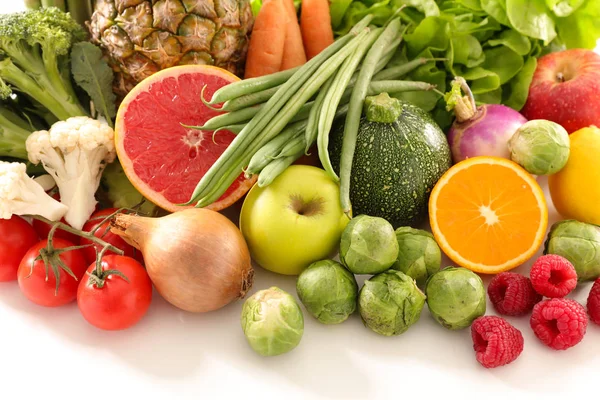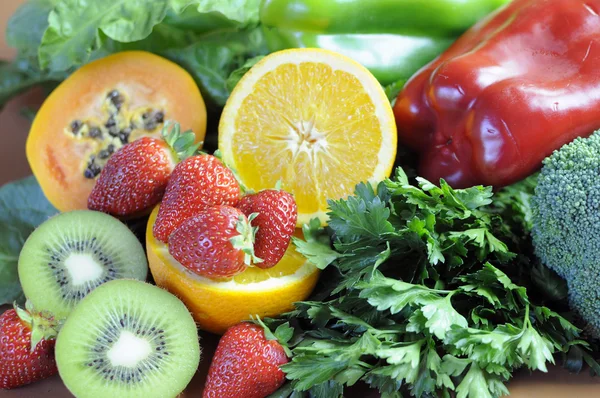How to Conserve Vitamin C During Food Preparation – Vitamin C, also known as ascorbic acid, is a water-soluble vitamin that cannot be produced by the body. It is found in many fruits and vegetables, including citrus fruits, kiwi, strawberries, tomatoes, bell peppers, and broccoli. It is an antioxidant that helps protect cells from damage caused by free radicals, which are unstable molecules that can damage cells and contribute to aging and diseases such as cancer and heart disease. Vitamin C promotes the production of collagen, and aids in the absorption of iron. However, vitamin C is sensitive to heat, air, and light, which means it can be easily lost during food preparation. In this article, we will discuss how to conserve vitamin C during food preparation to ensure that you get the maximum benefit from this essential nutrient.
How to Conserve Vitamin C During Food Preparation
To get the maximum benefit from vitamin C, it is essential to conserve it during food preparation. Here are some tips on how to do that:
1. Use minimal water when cooking
When cooking vegetables, try to use minimal water to conserve the vitamin C content. Vitamin C is water-soluble, which means it can leach out of the vegetables into the cooking water. To prevent this, try steaming or stir-frying the vegetables instead of boiling them. If you must boil them, use the minimum amount of water necessary and avoid overcooking them.
2. Cut fruits and vegetables just before eating
Cutting fruits and vegetables exposes them to air and light, which can cause vitamin C to break down. To conserve vitamin C, cut fruits and vegetables just before eating them. If you must cut them ahead of time, store them in an airtight container in the refrigerator.
3. Store fruits and vegetables properly
Storing fruits and vegetables properly can help conserve their vitamin C content. Vitamin C is sensitive to light and air, so store fruits and vegetables in a cool, dark place. Avoid storing them in the refrigerator door or in direct sunlight, as this can cause vitamin C to break down.
4. Choose fresh fruits and vegetables
Another step in conserving vitamin C during food preparation is to choose fresh and ripe produce. Vitamin C is easily destroyed when fruits and vegetables are stored for a long time or when they are overripe. Therefore, it is essential to choose fresh produce and use them as soon as possible.
5. Avoid overcooking
Overcooking can cause vitamin C to break down, so try to avoid overcooking your food. Cook your food just until it is tender, and avoid boiling or simmering it for extended periods.
Also, Cook foods quickly to minimize the amount of time they are exposed to heat. The longer the cooking time, the more vitamin C will be lost.
6. Eat fruits and vegetables raw
Eating fruits and vegetables raw can help conserve their vitamin C content. Cooking can cause vitamin C to break down, so try to incorporate raw fruits and vegetables into your diet whenever possible.
7. Avoid using baking soda
Baking soda can cause vitamin C to break down, so avoid using it when cooking fruits and vegetables. Instead, use lemon juice or vinegar to add flavor to your food.
8. Use the right cooking method
The cooking method you use can affect the vitamin C content of your food. To conserve vitamin C, try to use cooking methods that minimize heat exposure, such as steaming, stir-frying, or microwaving. These methods can help retain more vitamin C than boiling or frying.
9. Use vitamin C-rich ingredients in cooking
Using vitamin C-rich ingredients in cooking can help in conserving vitamin C. Ingredients such as lemon juice, lime juice, and vinegar are rich in vitamin C and can help in preserving the vitamin C content of other ingredients.
You may also like | Carrot Fufu Recipe: How To Make It At Home

Why is Vitamin C Important?
Vitamin C is important for several reasons, including:
- It is an antioxidant that helps protect cells from damage caused by free radicals.
- It plays a crucial role in collagen synthesis, which is essential for maintaining healthy skin, bones, and cartilage.
- It helps improve iron absorption from plant-based foods.
- It supports the immune system and helps fight off infections and illnesses.
Factors that Affect Vitamin C Loss
Now that we know why vitamin C is important, let’s discuss the factors that can affect its loss during food preparation.
Heat
Vitamin C is sensitive to heat and can be easily destroyed when exposed to high temperatures. Cooking methods such as boiling, baking, and frying can significantly reduce the vitamin C content of foods.
Light
Exposure to light can also cause vitamin C loss. That’s why it is recommended to store fruits and vegetables in a dark, cool place to help preserve their vitamin C content.
Air
Oxygen in the air can also cause vitamin C loss. That’s why it is essential to keep fruits and vegetables tightly sealed or covered during storage.
Processing
Food processing can also affect the vitamin C content of foods. For example, cutting or slicing fruits and vegetables can expose them to air and light, leading to vitamin C loss.
Conclusion
Vitamin C is an essential vitamin that plays a crucial role in maintaining good health. It is easily destroyed during food preparation, and therefore, it is essential to conserve it. Choosing fresh and ripe produce, avoiding peeling and cutting fruits and vegetables, using minimal water during cooking, cooking fruits and vegetables for a shorter time, storing fruits and vegetables properly, using vitamin C-rich ingredients in cooking, and serving fruits and vegetables raw are some of the ways to conserve vitamin C during food preparation.










